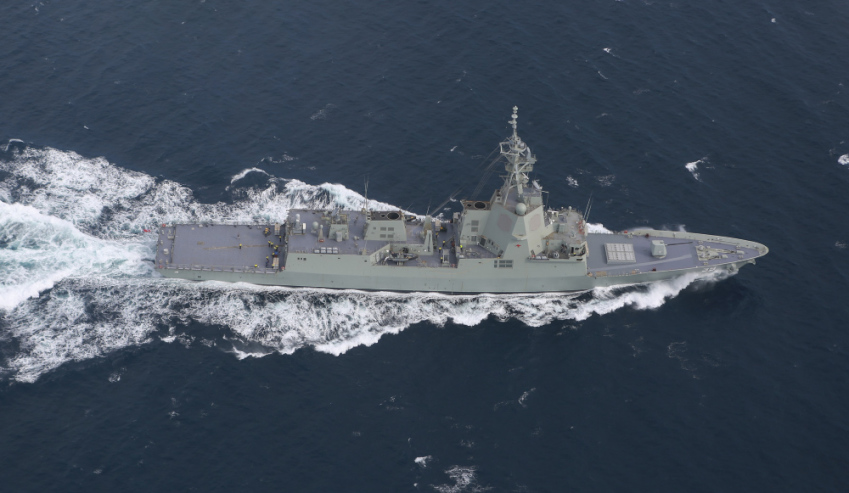Inclusion of ASC Shipbuilding and Austal on the SEA 5000 Future Frigates Project will help establish a sovereign shipbuilding capability, ASC chairman Bruce Carter has said.
To continue reading the rest of this article, please log in.
Create free account to get unlimited news articles and more!
Appearing at the Senate inquiry into the future of Australian shipbuilding, Carter talked up the value of using the workforce and experience of the two Australian shipbuilding companies on the $35 billion Future Frigates project.
"ASC Shipbuilding and Austal are not seeking to disrupt the defence approach," Carter said.
"Rather, the companies are proposing to subcontract or partner with the winning designer to provide a shipbuilding capability with proven experience in delivering Aegis-based warships to the Royal Australian Navy.
"The ASC Shipbuilding/Austal approach reduces [technical], commercial [and] cultural risk to the foreign-owned designer and de-risks the government's schedule to cut steel on the project in 2020."
Spanish company Navantia, Italian firm Fincantieri and the UK's BAE Systems have been shortlisted to design, build and sustain the nine Future Frigates to replace Australia's existing Anzac frigate fleet. Austal and ASC's participation in the project with the three bidders looked promising prior to the release of the request for tender in March this year.
Evidence presented by Austal chief executive David Singleton and ASC Shipbuilding CEO Mark Lamarre at the Senate hearing held Friday, 8 September said there was an abrupt change in the companies' engagement with all three international contenders after they received the request for tender from the government, which had no requirement for the use of an Australian shipbuilder – with specific reference to ASC.
"Prior to the release of the RFT we, Austal, were heavily involved with all three of the foreign design companies to provide an Australian shipbuilding solution to their offer to the government," Singleton told the hearing.
"When the RFT came out that was really the end of that engagement between us and those companies."
ASC Shipbuilding's Mark Lamarre echoed these sentiments, adding, "I would say there was a change [in dialogue] after the issue of the RFT, absolutely."
Carter said at the hearing the government's decision to allow foreign shipbuilders to come in and take the lead on the major project is in stark contrast to other first-world countries.
"It would be inconsistent with other countries’ practices for a first-world nation like Australia to, as its first step in establishing continuous major warship construction, let its current major warship project run down almost to a halt and then invite in a foreign shipbuilder to carry out the next major project," Carter said.
"Fundamentally, shipbuilding is about people. Talented, skilled, experienced people operating as an integrated workforce of white and blue collar workers.
"What appears missing from this debate is an appreciation in some quarters of the value of this workforce."
Carter stressed more options must be looked at to maintain the skills of the existing ASC Shipbuilding workforce if the government hopes to achieve a sovereign capability.
"We cannot expect about 1,000 workers to be out of work by the end of 2019 and hope for the best ahead of the commencement of SEA 5000 in 2020 with the first frigate to be started in 2022," he said.
"Their skills will be lost as well as their integrated value as a team. We have to look at other options now."
ASC is currently looking at the possibility of overseas contracts, which it hopes will secure up to 600 jobs.
"ASC Shipbuilding's skillbase is shipbuilding. That is why [ASC] Shipbuilding is exploring possible ship export customers with a number of overseas designers and customers. If successful, we believe that we could achieve a jobs uplift of between three to six hundred positions over and above what is required for Australian shipbuilding programs, including the AWD project, which is scheduled to finish at the end of 2019," Carter said.
"We acknowledge these plans are in their infancy, but we're encouraged by the government's bold plan to pursue export markets contained in the Naval Shipbuilding Plan and consider Australian companies the best place to make this happen.
"ASC Shipbuilding is Australian owned and controlled, staffed by Australians and accustomed to doing business in Australia at Australian stands and Australian operational requirements at world benchmarks. This is as good a definition as I can find of sovereign shipbuilding."
The nine future frigate vessels are scheduled to begin construction in Adelaide in 2020.
A decision on the successful tenderer is expected by April next year.

 Login
Login







